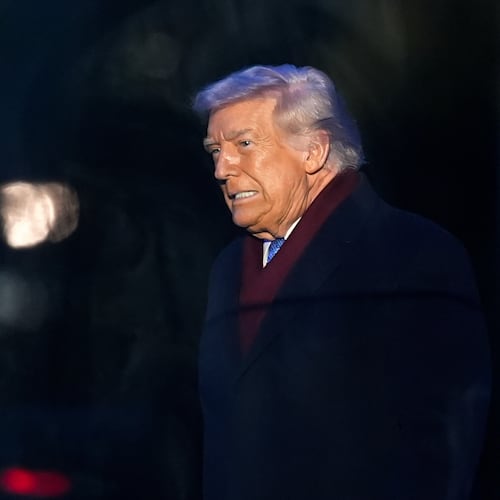The message was unmistakable. On Labor Day 1976, the traditional kickoff of the fall campaign, Jimmy Carter stood in front of Franklin D. Roosevelt’s Little White House in Warm Springs, Ga., where the 32nd president had died in April 1945. As he opened the final months of the race against Gerald R. Ford, Carter was offering himself as a dynamic Democratic alternative to a staid Republican president.
To Carter, FDR’s 1932 opponent, Herbert Hoover, had been “a decent and well-intentioned man who sincerely believed that there was nothing our government could or should do to attack the terrible economic and social ills of our nation… . But Roosevelt knew our country could be better, and with bold and forceful action he restored confidence in our economic system, he put our nation back to work, and he unified our people.”
Credit: Handout
Credit: Handout
Jimmy Carter was inviting America to see him as an heir of FDR, and now, as the nation marks the death of the 39th president, it is illuminating to consider how Carter envisioned not only the presidency but the nation he led. “The Presidency is not merely an administrative office,” Roosevelt said in 1932. “It is more than an engineering job, efficient or inefficient. It is pre-eminently a place of moral leadership.”
Farmer, naval officer, nuclear engineer, Christian and politician, President Carter would prove both engineer and moral leader, and his understanding of the country was at once technical and theological — a reminder that presidents have both practical and pastoral roles to play in the life of the nation. “Ours was the first society openly to define itself in terms of both spirituality and of human liberty,” he said in his inaugural address. “It is that unique self- definition which has given us an exceptional appeal, but it also imposes on us a special obligation, to take on those moral duties which, when assumed, seem invariably to be in our own best interests.”
He would pick up the theme in the summer of 1979, when he addressed the country on what he called the nation’s “crisis of confidence.” In those remarks from the Oval Office, Carter spoke of America not as an abstraction or a clinical polity, but as a true body politic — a congregation, if you will. The loss of faith in the future, Carter said, “strikes at the very heart and soul and spirit of our national will.”
And what did he mean by “soul”? In Hebrew and in Greek, “soul” can be translated as “breath” or “life,” and suggests that the soul is the essence of who we are. In 2019, I asked President Carter to define the best elements of the soul of America. “Well, the best parts are when we treat people as equals,” he replied, “and I would say that equality of treatment of people is the foundation for the [United Nations’] Universal Declaration of Human Rights. Between African Americans and white people, between men and women, between the downtrodden and those who have everything. And one of the essences of human rights is that if there’s an obvious disparity between opportunities for people, it’s to make everybody have basically the same opportunity for advancement.”
And the worst element? “Inequality,” Carter said. “When we start thinking that white people are better than Black or men are better than women, or that people like me whose ancestors came over here a long time ago [are better than] people who are just trying to become citizens … . I think that inequality is the worst thing about our country when it happens and it’s happened a lot lately.”
As Emerson once remarked, there is properly no history, only biography, and Carter’s personal experience informed his understanding of the country, particularly on questions of race. Born into the Jim Crow South, Carter lived the tragedy of segregation — yet also saw the possibilities of progress. “In many ways I was very fortunate as a future presidential candidate because I lived in a community that had about 55 farm families,” Carter recalled. “My father was the only white one, so I grew up completely surrounded by African Americans … . All my playmates were Black kids. And my mother was a registered nurse and she was gone a lot, nursing in the community. So African American women taught me the basic rudiments of society and the proper way to act towards other people.”
Then, while serving in the Navy, he experienced the post-1948 desegregation of the military firsthand. “I was in a submarine when Harry Truman ordained as commander and chief that the end of racial discrimination had come in the armed services and the civil service. So I was very lucky to see the ravages of racial discrimination when it was very heavily imposed in the community where I lived, and also to see the ease of change when Harry Truman ordained that it be brought about on ships and the army.”
Carter’s was a great and consequential life — a life devoted to the highest of American ideals, the fulfillment of the promise of the Declaration of Independence at home and abroad. At Warm Springs, where the 1976 general-election campaign began, FDR had drafted a Jefferson Day speech he was scheduled to give on April 13, 1945. In it, Roosevelt was to say that America must embrace the future “with strong and active faith.”
He did not live to deliver that address. But Jimmy Carter, for one, did move forward in just that way. And so must we.
Jon Meacham holds the Rogers Chair in the American Presidency at Vanderbilt University. He is the author, most recently, of “And There Was Light: Abraham Lincoln and the American Struggle.”
About the Author
Keep Reading
The Latest
Featured



